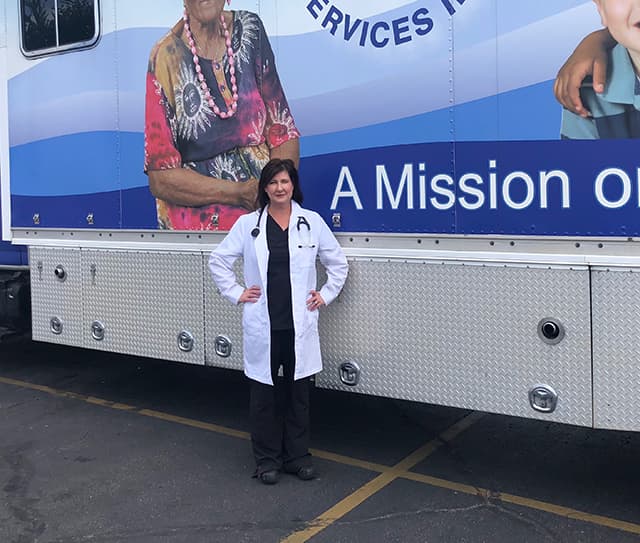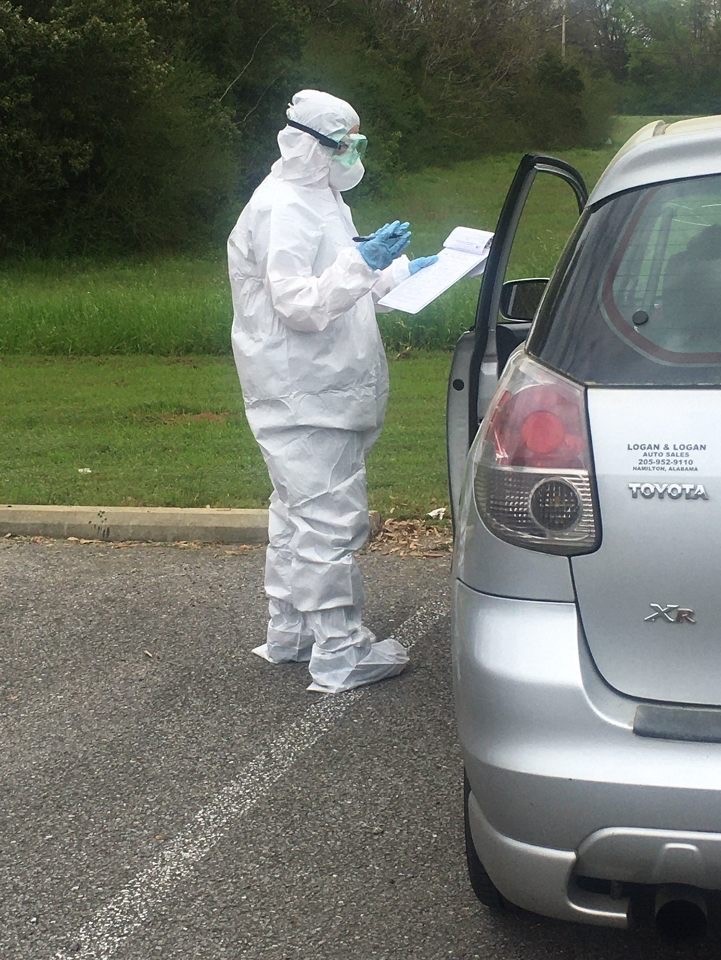
Just a few weeks ago, Tonya Shanahan, Ida Moffett School of Nursing alumna and assistant professor, was balancing teaching her nurse practitioner students and providing primary care at Maude Whatley Health, a community health center in Tuscaloosa, Alabama. Today, her work day looks drastically different as she now also balances providing COVID-19 screening and testing.
Prior to COVID-19, Shanahan was serving on the Maude Whatley Health mobile unit providing health care to some of the state’s most vulnerable populations. COVID-19 has not only changed the way her practice looks, but it has limited access to health care for many vulnerable populations.
“My day looks very different from before COVID-19,” said Shanahan. “My workday varies from COVID-19 testing to implementing telehealth to seeing patients in clinic. My day always begins with a temperature check prior to leaving for clinic. For COVID-19 testing days, I report to a tent, tape off areas deemed contaminated—where I quarantine myself for the day, don personal protective equipment (PPE), and wait for patients to drive up for COVID-19 screening/testing.”
 The recent rise in temperatures has added an extra layer of concern for providers who are assessing patients outside while wearing PPE. PPE prevents airflow and once gowned it is difficult to remain hydrated due to high risk of contamination. On her first day of testing, Shanahan was not adequately prepared and she experienced dehydration with all the symptoms it brings. She was able to self-treat with fluid and salt intake along with rest. Now, she is aware of the risk and makes sure to have adequate fluid intake prior to gowning up and she takes a break every three to four hours.
The recent rise in temperatures has added an extra layer of concern for providers who are assessing patients outside while wearing PPE. PPE prevents airflow and once gowned it is difficult to remain hydrated due to high risk of contamination. On her first day of testing, Shanahan was not adequately prepared and she experienced dehydration with all the symptoms it brings. She was able to self-treat with fluid and salt intake along with rest. Now, she is aware of the risk and makes sure to have adequate fluid intake prior to gowning up and she takes a break every three to four hours.
For her clinic days, Shanahan arrives early, masks up for clinic and begins reviewing the schedule. In her review, she tries to identify patients at high risk for COVID-19 and changes their visits to telehealth consultations to decrease exposure. For patients that must come into the clinic, she tries to attend to immediate needs while minimizing contact.
According to Shanahan, the days she is screening and testing for COVID-19 are her safest days because she is fully gowned in PPE and therefore her risk of exposure is minimal.
While her new normal has brought concerns, Shanahan says she is not afraid. “When I feel worry or concern, I refocus my thoughts on Jesus. I believe He has called me for such a time as this and He will not leave me.”
Shanahan attributes her ability to keep serving patients during such an uncertain time to her faith and experience at Samford University. “As a student, the nursing graduate faculty mentored me not only in the classroom, but encouraged me to stretch myself knowing God’s grace and mercy surrounds me,” she said. “As a faculty member I am challenged by Ida Moffett’s legacy to push myself past my limits. Her legacy encourages and inspires me. I hold tight to the characteristics Ida Moffett describes as essential to being an exceptional nurse—compassion, courage and a commitment to service all combined with deep knowledge and exceptional clinical skills.”
Shanahan is continuing to teach her nurse practitioner students virtually. Many of her students are serving as registered nurses across the country and she has encouraged them to show others how, as believers, we walk in peace knowing God equipped us to walk this journey and bring glory to His Kingdom.
To view the most recent information about Samford University related to COVID-19, visit our COVID-19 webpage for ongoing updates.
